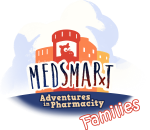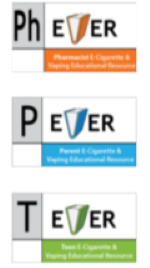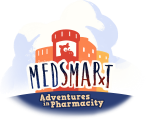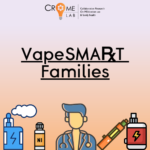CRoME Research in Action
At the CRoME Lab, our mission is to bridge healthcare, technology, and family-centered interventions to improve health and well-being, particularly for vulnerable and underserved youth. We lead innovative projects focused on medication safety, health education, and culturally relevant health practices, collaborating with schools, families, and healthcare providers.
Our work spans from developing interactive tools like serious games to empower adolescents and their families with essential knowledge about health risks to creating culturally tailored programs that support healthy lifestyle choices. By advancing evidence-based and community-driven solutions, we strive to promote positive health outcomes and inspire proactive health behaviors across diverse communities.
Research Core 1: Medication & Vaping Safety Interventions
We apply an interdisciplinary approach to investigating key issues on medication safety and family health. Our current projects focus on creating innovative methods for use in schools, homes, and clinics to educate youth and parents about prescription opioid safety.
MedSMA℞T Families is a novel family-based intervention that utilizes a game-based participatory approach to facilitate parent-teen communication about medication safety in homes, schools, and other relevant community settings where medication misuse might occur. Our MedSMA℞T Families intervention also incorporates the co-creation of a personalized family medication safety plan by parents and their teens to proactively foster family conversations about safe and responsible management of medications.
The EVER intervention is a tailored educational resource for pharmacists, parents, and teens about the prevention, risks, and cessation of e-cigarettes. The intervention includes an online compendium of educational resources and a Family Vaping Safety Plan. In collaboration with adolescents, parents, and pharmacists throughout Wisconsin, our team co-developed a pharmacist-provided educational resource on vaping for adolescents and parents, the Pharmacist-Led E-cigarette and Vaping Educational Resource (Ph-EVER), to disseminate prevention and cessation information on e-cigarettes. The Ph-EVER consists of two infographics, with one tailored towards adolescents (Teen E-cigarette and Vaping Educational Resource; T-EVER) and the other tailored towards parents (Parent E-cigarette and Vaping Educational Resource; P-EVER).
Research Core 2: Game-based Learning
Our team focuses on creating effective, engaging, and interactive serious game interventions that promote safe medication use, improved health outcomes, and positive health behavior change.
MedSMA℞T: Adventures in PharmaCity is a serious game designed to convey information and teach skills about the appropriate and responsible use of medications. The current prototype focuses on prescription opioid safety among adolescents and young adults. Our team is working closes with schools and clinics to inform the development of our digital intervention.
VapeSMA℞T Families is a new serious game toolkit under development by the CRoME Lab. VapeSMA℞T is intended to teach adolescents and their parents about important safety and prevention information related to e-cigarettes and vaping. The VapeSMA℞T Families toolkit will include the game and a personalized family vaping safety plan. While there have been other serious games developed by Yale for adolescent vaping on the dangers of e-cigarettes and skills to resist peer pressure, we wanted to develop a game (VapeSMA℞T) grounded in our previous research work on the Pharmacist-Led E-cigarette and Vaping Educational Resource (Ph-EVER) and in collaboration with community partners in Wisconsin.
OutSMA℞T Cancer is a theoretically driven game-based intervention created to educate adolescents and parents/guardians about evidence-based strategies for cancer prevention such as HPV vaccination. Using a participatory design approach, we are developing a serious game intervention (OutSMA℞T Cancer) to increase youth and their families' awareness about cancer prevention strategies. OutSMA℞T Cancer provides developmentally appropriate cancer prevention education.
OutSMA℞T Dementia is a new serious game under development by the CRoME Lab. This new evidence-based serious game is designed with caregivers in mind. In the game, players take on the role of both an older adult living with dementia who interacts with other adults, family members, medical professionals, and their adult child who is acting as their caregiver. During the game, players will be immersed in different realistic contexts, from holidays at a relative’s house to complex social scenarios that include distracting environmental dynamics. The game will help develop and sharpen caregiving strategies, help caregivers manage the emotional aspects of caring for someone living with dementia, and also provide a glimpse into what it is like to live with cognitive decline.
- SleepSMA℞T Families is a novel, theory-driven serious game under development by the CRoME Lab. The purpose of SleepSMA℞T is to educate youth and their families on critical aspects of sleep hygiene, over-the-counter and prescription sleep medications, and the risks of unhealthy sleeping habits. This game will be a part of a family-focused toolkit, which will include a personalized Family SleepSMA℞T Plan.
Research Core 3: Culturally-centered Complementary and Alternative Medicine (C-CAM)
Research has reiterated time and time again that families from historically made vulnerable groups experience not only worse medication and health outcomes, but often experience cultural mismatch in the health systems where they seek care. In line with this knowledge, the CRoME Lab is establishing a new research core exploring the potential for culturally-centered Complementary and Alternative Medicine to improve health and well-being while empowering marginalized ethnocultural groups. Culture encompasses a wide array of self-expression as well as social practices and artifacts. Well-known cultural artifacts such as dance, music, and other forms of art are integral to self-expression and health for many across the globe. By leveraging culturally salient and meaningful modes of expression and movement, we can seek to improve health and well-being while providing people with community and space for safe cultural expression. In the CRoME Lab, we know that music and dance are much more than sources of entertainment. Dance is Medicine. Music is Medicine.
- Gospel Afrobeat dance MEdicine (GAME) is a theory-driven, culturally specific, family-based program under development in the CRoME lab. The 8-week, biweekly, 60-minute (16-hour) gospel afrobeat dance program will be led by two trained race-concordant instructors. According to the Wisconsin Department of Health Services, only 20% of adolescents in grades 9-12 achieve 1 hour or more of physical activity daily. Physical activity declines with age for all races, but African American/Black adults are 20-30% less likely to engage in physical activity than Non-Hispanic White adults. African American/Black children and adults face unique challenges that hinder their participation in active lifestyles, such as limited access to safe recreational spaces and the lack of culturally appropriate physical activity programs.
- Gospel music and dancing are integral aspects of African American/Black culture. Afrobeat dance is a unique style that evolved from traditional Sub-Saharan African dance styles following the creation of Afrobeat music. The dance incorporates arms, legs, shoulders, and hip movements, along with scuffing, shuffling, stamping, and hopping steps. This intricate choreography requires motor coordination and endurance. Unlike regular afrobeat, the content of gospel afrobeat is confined to songs about the Christian faith. Unlike regular afrobeat, the content of gospel afrobeat is confined to songs about the Christian faith. Gospel afrobeat dance can be a practical and effective approach to engage young African Americans in an enjoyable, low-cost, culturally, and spiritually relevant physical activity. Limited studies on Gospel Afrobeat dance have shown promise as an informal approach to promoting positive lifestyle changes and improving cognition in older adults. However, there is limited research on adolescents.
Research aims:
- Using participatory planning with stakeholders, design a culturally specific family-based 8-week Gospel Afrobeat dance intervention, GAME, to improve mood, quality of life, and physical fitness in adolescents (ages 11-16) and their parents/caregivers.
- Pilot the GAME intervention and utilize participant feedback to examine the feasibility and acceptability of the program
Research Core 4: Cancer Education and Literacy
In order to reduce cancer health disparities, it is imperative that youth understand cancer etiology, risk factors, and health behaviors that can be modified to reduce lifetime cancer risks. Using participatory design techniques and involving adolescents as community stakeholders, we directly engage diverse youth from urban and rural communities to develop interactive and effective approaches for increasing awareness about cancer and cancer prevention.
Publications
Exploring middle school students’ perspectives on utilizing serious games for cancer prevention education: a focus group studyJMIR Serious Games. Accepted for publication on October 12, 2021.
Adolescents’ perceptions about cancer and preferences for cancer education. Cancer Control. 2021;28:1-12.
Exploring youth perceptions about cancer prevention and preferences for education: a qualitative study. J Cancer Educ. 2021. Available online August 13, 2021.
Research Core 5: Cystic Fibrosis Medication Management
The role of the pharmacist is key to optimizing the health outcomes for people living with cystic fibrosis (CF). Our current project focuses on applying a human factors approach to investigating the role of pharmacists and team-based care in improving medication management for people living with CF.
Publications
Using a work system framework to investigate pharmacists’ roles in cystic fibrosis management.J Pediatr Pharmacol Ther. 2022;27(3):270-276. doi:10.5863/1551-6776-27.3.270
Characterizing medication management and the role of pharmacists in caring for people living with cystic fibrosis: A work system approach. J Am Pharm Assoc. 2021;61(5):547-554. doi:10.1016/j.japh.2021.04.006
Opportunities for outpatient pharmacy services for patients with cystic fibrosis: perceptions of healthcare team members. Pharmacy. 2019;7(2)34. doi: 10.3390/pharmacy7020034
Pharmacists’ role in supporting people living with cystic fibrosis. J Am Pharm Assoc. 2018;58(3):246-249. doi: 10.1016/j.japh.2018.01.006






